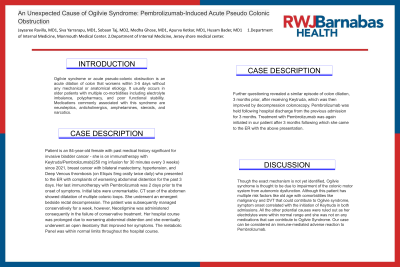Monday Poster Session
Category: Colon
P1672 - An Unexpected Cause of Ogilvie Syndrome: Pembrolizumab-Induced Acute Pseudo Colonic Obstruction
Monday, October 23, 2023
10:30 AM - 4:15 PM PT
Location: Exhibit Hall

Has Audio
- JR
Jayasree Ravilla, MD
Monmouth Medical Center/RWJBH
Long Branch, NJ
Presenting Author(s)
Jayasree Ravilla, MD1, Siva Naga Srinivas Yarrarapu, MD1, Sobaan Taj, MD2, Medha Ghose, MD3, Apurva Ketkar, MD3, Husam Bader, MD1
1Monmouth Medical Center/RWJBH, Long Branch, NJ; 2Hackensack Meridian Jersey Shore University Medical Center, Neptune, NJ; 3Monmouth Medical Center, Long Branch, NJ
Introduction: Ogilvie syndrome or acute pseudo-colonic obstruction is an acute dilation of colon that worsens within 3-5 days without any mechanical or anatomical etiology. It usually occurs in older patients with multiple co-morbidities including electrolyte imbalance, polypharmacy, and poor functional stability. Medications commonly associated with this syndrome are neuroleptics, anticholinergics, amphetamines, steroids, and narcotics.
Case Description/Methods: Patient is an 84-year-old female with past medical history significant for invasive bladder cancer - she is on immunotherapy with Keytruda/Pembrolizumab(250 mg infusion for 30 minutes every 3 weeks) since 2021, breast cancer with bilateral mastectomy, hypertension, and Deep Venous thrombosis (on Eliquis 5mg orally twice daily) who presented to the ER with complaints of worsening abdominal distention for the past 3 days. Her last immunotherapy with Pembrolizumab was 2 days prior to the onset of symptoms. Initial labs were unremarkable. CT scan of the abdomen showed dilatation of multiple colonic loops. She underwent an emergent bedside rectal decompression. The patient was subsequently managed conservatively for a week, however, Neostigmine was administered consequently in the failure of conservative treatment. Her hospital course was prolonged due to worsening abdominal distention and she eventually underwent an open ileostomy that improved her symptoms. The metabolic Panel was within normal limits throughout the hospital course. Further questioning revealed a similar episode of colon dilation, 3 months prior, after receiving Keytruda, which was then improved by decompression colonoscopy. Pembrolizumab was held following hospital discharge from the previous admission for 3 months. Treatment with Pembrolizumab was again initiated in our patient after 3 months following which she came to the ER with the above presentation.
Discussion: Though the exact mechanism is not yet identified, Ogilvie syndrome is thought to be due to impairment of the colonic motor system from autonomic dysfunction. Although this patient has multiple risk factors like old age with comorbidities like malignancy and DVT that could contribute to Ogilvie syndrome, symptom onset correlated with the initiation of Keytruda in both admissions. All the other potential causes were ruled out as her electrolytes were within normal range and she was not on any medications that can contribute to Ogilvie Syndrome. Our case can be considered an immune-mediated adverse reaction to Pembrolizumab.
Disclosures:
Jayasree Ravilla, MD1, Siva Naga Srinivas Yarrarapu, MD1, Sobaan Taj, MD2, Medha Ghose, MD3, Apurva Ketkar, MD3, Husam Bader, MD1. P1672 - An Unexpected Cause of Ogilvie Syndrome: Pembrolizumab-Induced Acute Pseudo Colonic Obstruction, ACG 2023 Annual Scientific Meeting Abstracts. Vancouver, BC, Canada: American College of Gastroenterology.
1Monmouth Medical Center/RWJBH, Long Branch, NJ; 2Hackensack Meridian Jersey Shore University Medical Center, Neptune, NJ; 3Monmouth Medical Center, Long Branch, NJ
Introduction: Ogilvie syndrome or acute pseudo-colonic obstruction is an acute dilation of colon that worsens within 3-5 days without any mechanical or anatomical etiology. It usually occurs in older patients with multiple co-morbidities including electrolyte imbalance, polypharmacy, and poor functional stability. Medications commonly associated with this syndrome are neuroleptics, anticholinergics, amphetamines, steroids, and narcotics.
Case Description/Methods: Patient is an 84-year-old female with past medical history significant for invasive bladder cancer - she is on immunotherapy with Keytruda/Pembrolizumab(250 mg infusion for 30 minutes every 3 weeks) since 2021, breast cancer with bilateral mastectomy, hypertension, and Deep Venous thrombosis (on Eliquis 5mg orally twice daily) who presented to the ER with complaints of worsening abdominal distention for the past 3 days. Her last immunotherapy with Pembrolizumab was 2 days prior to the onset of symptoms. Initial labs were unremarkable. CT scan of the abdomen showed dilatation of multiple colonic loops. She underwent an emergent bedside rectal decompression. The patient was subsequently managed conservatively for a week, however, Neostigmine was administered consequently in the failure of conservative treatment. Her hospital course was prolonged due to worsening abdominal distention and she eventually underwent an open ileostomy that improved her symptoms. The metabolic Panel was within normal limits throughout the hospital course. Further questioning revealed a similar episode of colon dilation, 3 months prior, after receiving Keytruda, which was then improved by decompression colonoscopy. Pembrolizumab was held following hospital discharge from the previous admission for 3 months. Treatment with Pembrolizumab was again initiated in our patient after 3 months following which she came to the ER with the above presentation.
Discussion: Though the exact mechanism is not yet identified, Ogilvie syndrome is thought to be due to impairment of the colonic motor system from autonomic dysfunction. Although this patient has multiple risk factors like old age with comorbidities like malignancy and DVT that could contribute to Ogilvie syndrome, symptom onset correlated with the initiation of Keytruda in both admissions. All the other potential causes were ruled out as her electrolytes were within normal range and she was not on any medications that can contribute to Ogilvie Syndrome. Our case can be considered an immune-mediated adverse reaction to Pembrolizumab.
Disclosures:
Jayasree Ravilla indicated no relevant financial relationships.
Siva Naga Srinivas Yarrarapu indicated no relevant financial relationships.
Sobaan Taj indicated no relevant financial relationships.
Medha Ghose indicated no relevant financial relationships.
Apurva Ketkar indicated no relevant financial relationships.
Husam Bader indicated no relevant financial relationships.
Jayasree Ravilla, MD1, Siva Naga Srinivas Yarrarapu, MD1, Sobaan Taj, MD2, Medha Ghose, MD3, Apurva Ketkar, MD3, Husam Bader, MD1. P1672 - An Unexpected Cause of Ogilvie Syndrome: Pembrolizumab-Induced Acute Pseudo Colonic Obstruction, ACG 2023 Annual Scientific Meeting Abstracts. Vancouver, BC, Canada: American College of Gastroenterology.
